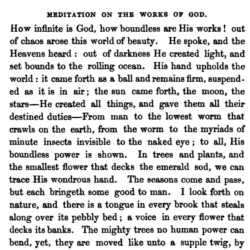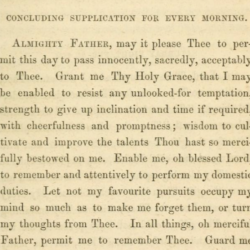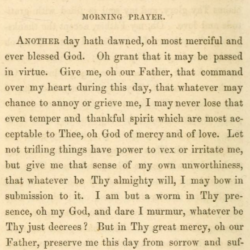| Contribute a translation | Source (English) |
|---|---|
Morning meditation. | |
With a glowing and a grateful heart do I hail the return of the sunny morn. The Lord in His mercy hath held me up during the dark and fearful night, and hath permitted me once more to hail the glad and glorious approach of day. | |
I will seek the Lord in the early morning when all is silent around me, when there is a holy calm in the stillness of nature, that softens every tumultuous feeling and calms the weary spirit, and fills the soul with adoration, then will I seek the Almighty, ere the cares, thoughts, and desires of this world have entered my heart; and He will bend His gracious ear to the prayers and praises of a child of sin, if offered up in love, in reverence, and in adoration. | |
I will awake from sleep, and arise early to seek my Creator, and offer Him the homage of a sinful, yet contrite heart, and in His infinite mercy He will deign to listen to my prayers. O how I love the Lord for all his mercies towards me! | |
In sorrow have I sought Him, and He hath answered me, for the prayers of the young are acceptable to our Beneficent Creator, if offered up in lowliness and humbleness of heart. | |
Think then, O my soul, how can I repay the manifold blessings I receive from the hand of my God; in what way dare I hope to evince the gratitude that gloweth in my heart. | |
Think of all thy imperfections, thy follies, and thy sins. How difficult I sometimes find it, to give up the inclinations of my heart. | |
Think on all this, O my soul, and know that fervent prayer alone can obtain pardon for my sins, and strength to guard against them. | |
And what good do I do? Satisfy not thyself, my soul, with the thought, that thou hast no opportunities of doing good: many there are, but, careless and impatient, they are overlooked. | |
Be on thy guard then, my soul, and let this day be passed in a manner acceptable to the Almighty, and pleasing to thyself. Beware, not to fall into the snares of temper and impatience. | |
Lord, give me strength that I may walk in Thy ways, and become a good and faithful servant of Thy law. Amen. |
“Morning meditation” by Grace Aguilar was published posthumously by her mother Sarah Aguilar in the UK edition of Sacred Communings, pp. 69-70. It is not found in the US edition.
Source(s)


“Morning Meditation, by Grace Aguilar (ca. 1830s)” is shared through the Open Siddur Project with a Creative Commons Public Domain Dedication 1.0 Universal license.




![morning hymn (Blessed art Thou) [version 1] (Grace Aguilar 1853) - cropped](https://opensiddur.org/wp-content/uploads/2023/05/morning-hymn-Blessed-art-Thou-version-1-Grace-Aguilar-1853-cropped-250x250.png)

![morning hymn (father of all) [in illness] (Grace Aguilar 1853) - cropped](https://opensiddur.org/wp-content/uploads/2023/05/morning-hymn-father-of-all-in-illness-Grace-Aguilar-1853-cropped-250x250.png)
![morning hymn (Blessed art Thou) [version 2] (Grace Aguilar 1853) - cropped](https://opensiddur.org/wp-content/uploads/2023/05/morning-hymn-Blessed-art-Thou-version-2-Grace-Aguilar-1853-cropped-250x250.png)


Leave a Reply